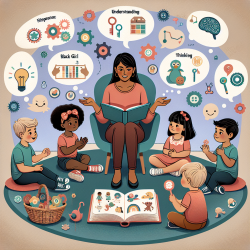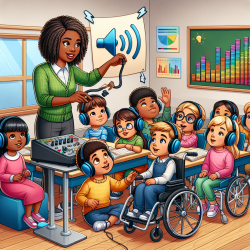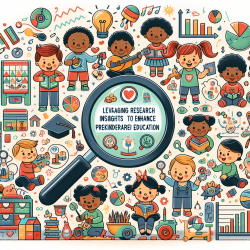Language comprehension is a foundational skill that sets the stage for future learning and literacy development in young children. The ability to understand and process language is crucial for academic success and effective communication. Unfortunately, traditional methods of assessing language comprehension in young children often fall short, focusing primarily on vocabulary and syntax rather than on the comprehension of discourse. This gap in assessment practices can hinder early identification and intervention for children with language impairments.
Recent research, including the study "The Validity of the Joint Story Retell as a Measure of Young Children's Comprehension of Familiar Stories" by Lynn F. Dempsey and Elizabeth Skarakis-Doyle, offers valuable insights into alternative methods for assessing language comprehension in young children. The Joint Story Retell (JSR) technique, highlighted in this study, presents an innovative approach to measuring oral story comprehension in preschool-aged children.
The JSR technique is adapted from the cloze procedure and evaluates a child's ability to retell a story with specific elements omitted by the examiner. This method places minimal demands on the child's expressive language skills, focusing instead on their comprehension of the narrative. The study's findings suggest that the JSR is sensitive to age differences and has a moderately strong, positive relationship with traditional comprehension questions, making it a potentially valid measure of young children's discourse comprehension.
For practitioners working with young children, incorporating the JSR technique into language assessment practices can provide a more comprehensive understanding of a child's language comprehension abilities. Here are some ways to implement the outcomes of this research:
- Early Identification: Use the JSR technique as part of a comprehensive language assessment battery to identify children with language impairments early. This can facilitate timely intervention and support.
- Intervention Planning: Incorporate findings from the JSR assessment into intervention plans. Tailoring activities to target specific areas of weakness in language comprehension can lead to more effective outcomes.
- Parent and Educator Collaboration: Share insights gained from the JSR assessment with parents and educators. Collaborating on strategies to support language comprehension in both the home and school environments can reinforce learning.
- Professional Development: Stay informed about the latest research in language assessment and intervention. Attending workshops, webinars, and conferences on topics like the JSR technique can enhance your skills and effectiveness as a practitioner.
Encouraging further research into the JSR technique and other innovative methods of language assessment is crucial. Expanding our toolkit for evaluating and supporting language development in young children can lead to more accurate diagnoses, more targeted interventions, and ultimately, better outcomes for children with language impairments.
As practitioners, embracing new research and methodologies, like the Joint Story Retell technique, can significantly impact our ability to support young children's language development. By fostering a deeper understanding of language comprehension and its assessment, we can contribute to the early identification and intervention for children with language impairments, setting them on a path to success.
To read the original research paper, please follow this link: The Validity of the Joint Story Retell as a Measure of Young Children's Comprehension of Familiar Stories.










